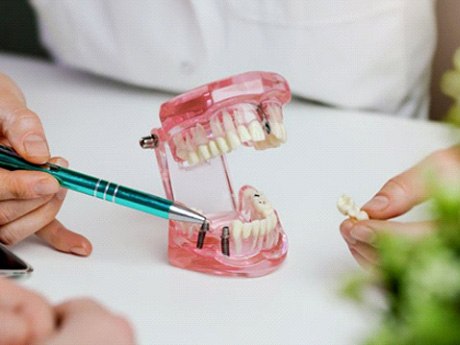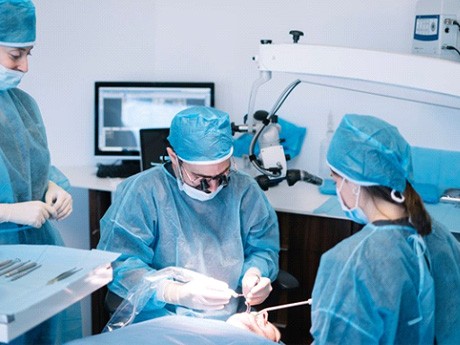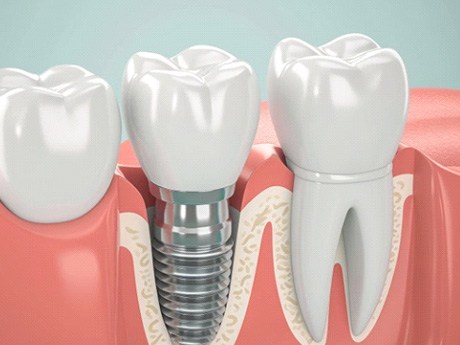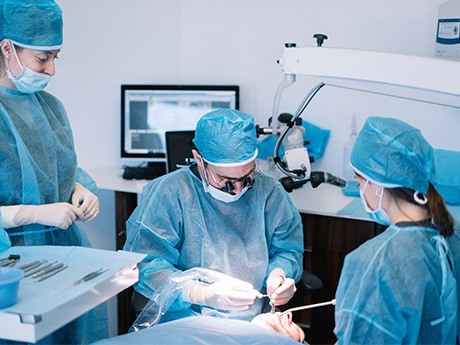Dental Implants – Marysville, OH
A Lifelong Solution for Missing Teeth
Having gaps in your smile can be devastating, but you don’t have to live that way forever. At Northwest Family Dental of Marysville, we’re happy to provide a life-changing method of tooth replacement unlike anything else. With dental implants in Marysville, you can replace your missing teeth from the roots up to the chewing surface. This modern solution establishes a lasting foundation, prioritizing oral health in addition to function and appearance. If you’re ready to say goodbye to tooth loss, continue reading or schedule a consultation with our team to learn more about this service.
Why Choose Northwest Family Dental of Marysville for Dental Implants?
- Start-to-Finish Implant Treatment
- Advanced Dental Technology for Precise Treatment Planning
- Insurance Welcome and Flexible Financing Available
What Are Dental Implants?

A dental implant is a small titanium post that’s surgically inserted into the jawbone to replace the entire structure of a missing tooth. Over time, it’ll naturally fuse with the surrounding bone tissue via a process called osseointegration. The implant is used to support a brand-new crown, bridge, or denture above the gum line. Since implanted teeth are built just like real teeth, your smile will look and feel incredibly natural!
The 4-Step Dental Implant Process

Getting dental implants in Marysville is a multi-step process that takes place over several months. While this entire journey can take longer than it takes to place a bridge or denture, many patients find the results to be well worth the effort. Each patient’s treatment will look slightly different, but the four main steps remain the same. Here’s what to expect from the dental implant process.
Initial Dental Implant Consultation

First, you’ll need to attend a consultation with our team to determine what’s needed to make you a viable candidate for dental implants. We’ll review your medical history and assess the current state of your oral health. If our team should detect any underlying problems, such as decay, periodontal infection, or insufficient jawbone density, then we’ll have to address the issue before moving forward with your surgery. Some patients may have to undergo preliminary services like gum disease treatment, bone grafting, or even tooth extraction so that their mouth is prepared for dental implants. Once we’ve addressed any complications in your oral health, we can develop a proper plan for your procedure.
Dental Implant Surgery

Once you’re ready to undergo implant surgery, we’ll schedule your appointment at our practice. We can perform the entire treatment in the office, so you won’t have to struggle with traveling to multiple locations for your dental care. To begin, our team will numb your mouth with a local anesthetic so that you don’t feel pain during your surgery. We can also provide you with sedation to increase comfort and relaxation.
After we’ve confirmed you’re safe and comfortable, your dentist will make small incisions in your gums to access the jawbone. We’ll insert your dental implants at precise angles and locations, then suture your gums closed to begin the healing process. We’ll also cover your implant with a dental cap to help protect it while you recover.
Dental Implant Osseointegration & Abutment

Your dental implants will naturally begin fusing with your jawbone shortly after they’ve been placed. This natural process is called osseointegration and takes three to six months to complete. Afterward, you should expect to gain a more stable and lifelike foundation for your restoration(s) to be fitted to, as your implants will function like natural tooth roots. Once you’ve recovered, you’ll receive abutments—small metal connector pieces—to keep your restorations in place.
Delivery of Dental Implant Restoration(s)

Once you’re all healed up, you’ll return to our office for the placement of your new crown, bridge, or denture. Your personalized restoration(s) will complete your smile, providing results that look and feel natural! Our team will need to verify that your bite is correct and that you’re satisfied with your treatment before sending you on your way to enjoy your new smile.
Benefits of Dental Implants

A dental implant is the only treatment to mimic both the root and the crown. This allows you to enjoy exceptional perks that aren’t possible using any other treatment. As one of the most comprehensive and lifelike solutions for tooth loss, you can be sure to appreciate a wide range of advantages to both you and your smile after receiving your restoration(s). Here are some of the benefits you can expect from your treatment.
Day-to-Day Benefits

- Stronger Bite: Due to dental implants being placed in the jawbone and fusing with your bone tissue, they can provide an incredibly strong and natural-feeling foundation for your teeth. This also means they can restore around 90% or more of your natural chewing power, which can allow you to expand your food choices to promote a more nutritional diet.
- Simpler Cleaning: Other tooth-replacement options like dentures or dental bridges typically require patients to use special techniques and tools to clean them effectively. With dental implants, you’ll be free to brush, floss, and rinse your smile with mouthwash just like with your natural pearly whites.
- Boosted Confidence: Tooth loss can negatively impact both your oral health and self-esteem. Rebuilding your complete smile with dental implants can help improve your confidence in your appearance, especially since you won’t have to worry about your new teeth moving out of place.
Health Benefits

- Better Oral Health: Tooth loss often leads to changes in your bite, as any remaining teeth will start to shift positions to fill the gap. Not only can this lead to further tooth loss, but it can also raise the risk of issues like misalignment and even gum disease. Dental implants can serve as placeholders to prevent your smile from changing drastically.
- Improved Overall Health: Since your teeth and gums will be much easier to maintain in the long run, you’ll also be able to prevent harmful conditions from arising, such as diabetes and cardiovascular disease.
- Jawbone Preservation: Dental implants work like natural tooth roots, meaning they can reliably support your restorations as well as stimulate the jawbone to promote healthy bone growth. Not only will this help prevent any teeth from moving, but it can also help you preserve your jaw structure as well as a more youthful facial shape.
Long-Term Benefits

- Successful & Long-Lasting Treatment: Dental implant treatment typically boasts a success rate of 95% or more even 10 years after being placed. Additionally, with proper care and regular dental checkups and cleanings, your metal posts can easily last for decades or even the rest of your life!
- Cost-Effective Method: Dentures and dental bridges typically have to be replaced every several years, which can add up the overall price of your treatment. Dental implant restorations won’t have to be replaced as often, meaning you can save more in the long run.
Who Can Dental Implants Help?

Whether you’re missing one or more teeth, dental implants can help restore your smile. At your consultation, our team will conduct a detailed examination of your mouth and bone structure to ensure you’re a good candidate for this treatment. Although the exact details of your treatment will vary based on your case, most healthy adults are eligible for this modern tooth loss solution.
Who is a Good Candidate for Dental Implants?

At your initial consultation, Dr. Miller will capture any necessary diagnostic images and conduct a thorough examination of your jawbone, facial anatomy, teeth, and gums. We like to see that patients receiving dental implants meet the following criteria:
- Sufficient jawbone density. The jawbone is thick enough to fuse with and support a dental implant. If it isn’t, a bone graft may be necessary before the implants can be placed.
- Good dental health. A smile that’s free of infection, decay, and other oral health concerns is necessary for successful results.
- Good overall health. If you have any medical conditions that could compromise the dental implant healing process, they will need to be under control before treatment can occur.
After our team has cleared you to move forward with dental implant surgery, we’ll schedule your procedure and walk you through the in-depth treatment plan that we created for you.
Missing One Tooth

If you’re missing a single tooth, Dr. Miller can place one dental implant below the gumline and into the jawbone. Once that has fused with the bone and the abutment is secured to the top of it, he will attach a customized dental crown to restore the gap in your smile. Depending on the locations of your missing teeth, Dr. Miller can combine implant crowns with implant bridges to replace several spaces throughout an arch.
Missing Multiple Teeth

One of the greatest downsides of traditional bridges is that they require the alteration of your existing teeth to anchor the prosthetic in place. With implant bridges, we’ll secure the restoration to two dental implants that are placed at either side of the space in your arch. That way, instead of using your natural teeth as anchors, the sturdy, stable dental implants will be the foundation of your bridge.
Missing All Teeth

To restore an entire row of missing teeth, Dr. Miller will place anywhere between four and eight dental implants along the gumline, within the jawbone. These will replace the missing roots of the teeth and act as a support system for a full denture, securing it firmly within the mouth. This allows patients to eliminate the slipping and shifting that can occur with traditional dentures.
Learn More About Implant Dentures Learn More About All-On-4 Dental Implants
Understanding the Cost of Dental Implants

The cost of dental implants in Marysville is not the same for everyone suffering from tooth loss. Instead, your price point is determined once you schedule an appointment with our implant dentist. It is during this visit that we will determine various factors that will serve to create your cost estimate. Once we have that, a member of our team will work to maximize any dental insurance benefits you might have as well as provide additional payment information should you need further assistance.
Preliminary Treatments & Dental Implant Surgery

Some of the components of your cost estimate will include preliminary treatments if your dentist decides that you need them. These can include bone grafting, periodontal treatment, or even tooth extraction.
Also, part of your cost estimate will include the actual surgical procedure. Because we do place dental implants in-house, you won’t have to worry about a separate bill for the actual placement procedure. Instead, you can expect your fees to be more compact compared to visiting an oral surgeon outside our practice!
The Parts of Your Dental Implant

Dental implants in Marysville are all different, so their parts often incur various fees, some of which include:
- The number of dental implant posts needed – Depending on whether you need one, multiples, or an entire arch, how many dental implants you have put into place will make a difference when it comes to cost.
- The materials used – Titanium and zirconia are the two most popular materials dentists use when choosing dental implants.
- The type of restoration needed – When meeting with our implant dentist in Marysville, you can expect them to discuss the type of restoration you will need, which will be either a crown, bridge, or denture. Naturally, the latter will cost much more than a single dental crown.
- The brand – There are different brands and manufacturers of dental implants, and you may be tempted to go ahead with a cheaper brand. However, doing this will only result in lackluster results. Our team will explain why we choose higher-quality materials to help you obtain the smile you deserve.
How Dental Implants Can Save You Money

There are several unique ways you can actually save money when wearing dental implants:
- Dental implants do not require that you purchase additional products such as denture adhesives. These can add up over time.
- Dental implants do not require regular replacement or adjustment, so you can avoid additional visits to the dentist’s office for this type of maintenance.
- Dental implants prove beneficial for those suffering from tooth loss because of the minimized risk for systemic issues such as osteoporosis, heart disease, and diabetes. These are often linked to tooth loss, so by choosing dental implants, you can help to lower your risk of future, costly medical treatment.
Does My Dental Insurance Cover Dental Implants?

Some dental insurance companies now offer coverage for dental implants; however, many still do not. If yours will not provide coverage for the procedure, you may still be eligible to receive some level of financial assistance with your restoration or preliminary treatments. Our team will review your plan and maximize any of your available benefits so that you can save big when choosing dental implants.
Making Dental Implants Affordable

If you are uninsured, there are two additional ways you can pay for treatment apart from dental insurance and with cash, check, or credit card. There is the option to enroll in flexible financing through CareCredit, which allows you to break up your payments over several months. You can also enroll in our in-house membership plan, which is $400 per year, and you will receive access to preventive care as well as a 20% discount on other available treatments.
Dental Implant Failure & Salvage

Even if dental implants often boast a success rate of 95% or more with proper care, there’s always a rare chance that they can fail. This can be due to various reasons, which you’ll need to know so that you can minimize your risks of them. Fortunately, our team can provide dental implant salvage treatment so that you can return to making the most of your brand-new smile. We will determine the root cause of the failure and go over the kinds of services that you’ll need to address the issue.
Learn More About Dental Implant Failure & Salvage
Dental Implants Post-Op Instructions

As crucial as it is, placement surgery isn’t the end of dental implant treatment. Your mouth will need to heal before you can go out and enjoy your new teeth. The upside is that you don’t need to worry about this recovery process; we’ll help you. In fact, our practice’s dental implant post-op instructions in Marysville will ensure you heal quickly. Learn more about them by reading below, or call us for the details.
What to Do Directly After Dental Implant Surgery

Once your dental implants are placed, please leave the forming blood clot alone. Touching or poking it would delay (or even reverse) your treatment recovery. To that extent, do the following:
- For at least a few days, keep your fingers and tongue away from the surgical site(s).
- Rather than spit, swallow your saliva or use a tissue for dabbing.
- Avoid using tobacco products in the first 24 hours after surgery.
- Don’t use drinking straws for a while, as suction force can dislodge blood clots.
Common Side Effects When Recovering from Dental Implant Placement

You may face some side effects while recovering from dental implant placement. Common examples of these are:
- Swelling of Face or Gums – Your face or gums may swell during the first three days post-surgery. If that happens, apply a cold compress.
- Mouth-Related Discomfort – Once your surgery’s anesthesia wears off, your treatment site will likely ache. Use store-bought pain relievers to ease this soreness.
- Intermittent Bleeding – Soon after placement, your implant site could bleed slightly. In that case, gauze and light pressure should be applied to reduce symptoms.
The side effects above should fade after a few days. Please reach out if they don’t or feel worse instead.
Your Diet After Dental Implant Surgery

For a proper recovery, you should follow a soft food diet right after dental implant surgery. Eating tough meals would likely dislodge your blood clot or cause other issues.
As part of this soft food diet, you could have:
- Yogurt
- Soft Cheese
- Scrambled Eggs
- (Non-hot) Soup
- Mashed Potatoes
- Pasta
- Pudding
- Sweet Potatoes
- Smoothies
- Ice Cream
You should be ready to resume a normal diet a few weeks after surgery (or if you’re up to it). Just make sure you limit your intake of crunchy and tough foods. Similarly, please try not to chew directly on the implant site(s).
Post-Op Health & Oral Hygiene

Even after dental implant work, your mouth will need daily cleaning. Just make sure to include these tricks as part of your oral care process:
- Be careful of the surgical site(s) when brushing your teeth twice daily.
- Two or three times a day, rinse your mouth with salt water or a prescription mouthwash.
- To avoid complications, don’t use a mouthwash with a high level of alcohol (i.e., Scope, Listerine, etc.).
What to Do After Your New Teeth Are Attached

Once your new dental crown, bridge, or denture is attached to your implant(s), the hardest part of treatment is over. The most you’ll feel at that point is slight gum sensitivity – an easily managed symptom. In other words, you shouldn’t have any further swelling, bleeding, or extensions amidst your recovery. You can just go out and enjoy your restored grin!
Maintaining & Caring for Your Dental Implants

One of the biggest perks of dental implants is that they can last for three decades – you just need to take good care of them! If you’re not sure where to start, then this next section is for you. Of course, you’re more than welcome to reach out to our Marysville dental team with any questions you have as well.
Make Oral Hygiene a Priority

After investing your valuable time and money into the dental implant process, the last thing you want is for them to become loose or fall out. One of the leading causes of dental implant failure is peri-implantitis, which is a form of gum disease. So, make oral hygiene a priority! In addition to brushing twice a day, floss and rinse with mouthwash daily to prevent plaque and tartar from accumulating.
Tip: If you’re unsure of the proper brushing or flossing technique, ask our Marysville dental team! We’re here to be an ongoing resource for you.
Eat a Healthy Diet

A healthy, well-balanced diet won’t just benefit your overall health; it will benefit your oral health! So, make sure to fill your breakfast, lunch, and dinner with foods that are packed with nutrients, vitamins, and minerals. It’s also a good idea to exercise caution with extremely crunchy foods since they can chip a tooth or your restoration.
Break Bad Habits

Do you smoke, bite your nails, chew on the back of your pen, or use your teeth to open plastic wrapping? If so, now is the time to stop! Although your dental implants are crafted from high-quality, durable materials, they aren’t indestructible. So, do your best to break bad habits like these and, if you need any help, ask your primary care physician or our dental team.
Protect Your Dental Implants

If you clench your teeth when you’re stressed or grind your teeth at night, you need to wear a nightguard to protect your dental implants from harm. You should also wear a mouthguard if you participate in sports – even non-contact ones. It may seem unnecessary, but this dental device plays an essential role in protecting your smile from impact, making it essential.
Schedule Regular Dental Checkups

Even if you don’t have any of your natural teeth left, you need to come to our office every six months for a dental checkup and teeth cleaning. That way, we can screen for gum disease, oral cancer, and other common problems, and, if we find anything, intervene with the necessary care right away. At these appointments, we will also check the condition of your dental implants and answer any questions you have!
Dental Implants FAQs

Does Getting Dental Implants Hurt?
Just like with other dental procedures, our team will make sure to administer a local anesthetic to completely numb the area we’ll be working on before starting your treatment. This will allow you to be pain-free while we’re placing your titanium posts into your mouth. Also, the jawbone doesn’t consist of many nerve endings, so you shouldn’t expect much discomfort from your surgery. Our team will also provide sedation to further minimize your body’s ability to register pain.
The surgery itself won’t hurt, but you’ll likely feel sore for several days after your visit. Fortunately, this can be easily alleviated with over-the-counter/prescribed painkillers and a cold compress to reduce swelling. If you notice any discomfort that persists or worsens after three days, notify us right away for help.
How Long Do Dental Implants Last?
The longevity of your dental implants will usually be based on your overall health and your lifestyle choices. The majority of the time, you’ll simply want to make the most of them by implementing a good oral hygiene routine, such as brushing twice a day, flossing daily (or after meals), and rinsing with mouthwash frequently. You’ll also want to visit your dentist regularly for checkups and cleanings and refrain from chewing things that are too hard or sticky. With proper care, you can expect your new pearly whites to stay healthy for decades to a lifetime!
Can I Get Dental Implants If I’m Diabetic?
If you keep your condition under control, then you should be able to have similar chances of successful dental implants as nondiabetic patients. Diabetes that is left unchecked can end up interrupting the healing period, which can make it more difficult for your dental implants to fuse with your jawbone. Those who are diabetic and are interested in replacing missing teeth with dental implants should speak with their primary care doctor or endocrinologist about controlling their blood sugar levels before moving forward with their treatment.
What Can Cause Dental Implants to Fail?
Although it’s very rare, dental implants can fail due to one of two major reasons: failed osseointegration and peri-implantitis. In some instances, the metal post might not integrate properly with the jawbone, especially if the patient doesn’t have sufficient bone density at the start of the procedure. Peri-implantitis is a kind of periodontal disease that happens because of poor oral hygiene, resulting in damage to your bone and gum tissue that holds your implants in place.
There are also other potential causes of dental implant failure, including tobacco use, chronic teeth clenching/grinding, certain medications, radiation to the neck and head, and particular health conditions (diabetes, cancer, autoimmune disorders, etc.). During your consultation, your dentist will provide you with instructions on how to reduce your risk of implant failure.

